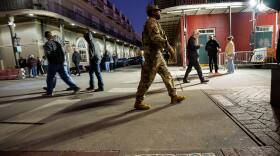In roughly nine years since he first came to Louisiana State Penitentiary, Patrick Jones has picked corn, okra, cabbage and beans by hand.
He’s cut grass. He’s baled hay. He’s made sandbags and carried them — all as an incarcerated worker on the site's "farm line."
But for people at the prison commonly referred to as Angola, being sent to the "farm line" is not quite the same as other work assignments, Jones testified in a federal courtroom this week.
“It is the only job that you are forced to have a gun pointed at you," Jones said. "You are forced to be talked to like you are less than a human being."
During a hearing spanning three days in Baton Rouge, more than 10 witnesses from both sides shed light on the "farm line" at the heart of a lawsuit brought by incarcerated men and the grassroots group Voice of the Experienced against Louisiana's prison system and its officials.
Hours of sworn testimony from corrections staff, incarcerated people and medical and academic experts provided a uniquely detailed account of the work assignment at Louisiana's most notorious prison — and of the contradictory views sometimes held by prison officials and people in their custody.
Working the “farm line” — compulsory work for pennies an hour, monitored by gun guards armed with an AR-15 and a pistol, at the site of a former plantation, often in sweltering heat — potentially risks their lives and traumatically evokes slavery, plaintiffs contend.
First filed in 2023, the case challenges the existence of the "farm line." Via lawyers with groups including Promise of Justice Initiative and Rights Behind Bars, plaintiffs argue the "farm line" endangers their physical and psychological health and violates the Eighth Amendment right to be free of "cruel and unusual" punishment.
The lawsuit brings together two things people in prisons across the country have recently taken issue with in courts: forced labor and rising heat.
Litigation challenging how incarcerated people are forced to work has gained attention in Alabama and in Colorado. As the climate changes, people in lockups also have fought for air conditioning and other heat mitigation measures.
Last month, a federal judge in Texas found that heat exposure in its prisons is unconstitutional, though he stopped short of requiring air conditioning. A federal lawsuit pending in Florida raises similar issues.
In their testimony and court filings, Angola officials have framed the "farm line" operations as crucial — providing fresh vegetables rather than canned counterparts for incarcerated people. They said that shrinking farm crews over the years have left good produce out to rot.
They also point to changes in access to sunscreen and shade. Heat alerts are regularly enforced, and people “work at their own pace and break whenever they need," testified Roland Sylvester, an assistant warden and 30-year veteran of the field operations at Angola.
A spokesperson for the Department of Public Safety & Corrections has said the agency would not be making a statement on the "pending litigation" at this time.

This week's hearing took place for Judge Brian A. Jackson to weigh whether to certify the case as a class action. That would comprise anyone who is or could be assigned to the "farm line," or most people at Angola, plaintiffs say. It also could include a subclass of people with disabilities.
As Louisiana’s fierce summer looms, Jackson also is mulling legal requests from the plaintiffs to order new heat protections, including expanding a list of drugs that qualify people for a special heat work status, trimming the heat index threshold at which work must stop and other changes.
That would follow commands by the court for various protections last summer, when Jackson wrote in a July order that "the dangers for incarcerated persons working in high-heat environments on the Farm Line is open and obvious."
‘Some of them give up’
Just a few dozen people a day are sometimes working in the fields on the "farm line," one corrections official estimated at this week's hearing. About a hundred can go out if counting tasks such as grass cutting.
For the people who make up that relatively small group, plaintiffs and their attorneys underscored the notion of choice: how one is assigned to the "farm line," and what happens to keep you there.
When most people arrive to begin serving a sentence at Angola, the "farm line" is the initial work assignment they receive after medical clearance and is mandatory for six months, according to an intake manual.
It was the first assignment for Damaris Jackson, one of the case plaintiffs, who was permitted to sit with his lawyers this week only once shackled to a chair in the courtroom. He said working the "farm line" can cause people to become irritable, walk in a daze or stop talking to family.
“I watch my fellow inmates; some of them give up. For me, watching my brothers give up is hard," he said.
Refusing to work on the "farm line" can lead to discipline, including being sent to solitary confinement — known colloquially as "the dungeon” — where Jackson said people in other cells cry out and are sometimes Maced by guards.
Meanwhile, master sergeant Orlando Scott, who currently works in "shakedown" at Angola but spent years as a field foreman, portrayed people in prison as malingering to evade work. He said they sometimes lie about whether they have a special heat-precaution status.
“They always complain about the work," he said.
Angola staff members did not deny that people could face discipline for infractions on the "farm line" and other assignments, including for disobeying orders or not working with appropriate speed and efficiency.
They also did not dispute the presence of gun guards on the "farm line," whose attendance is recorded on a sheet next to the line, “gun guard,” official paperwork displayed in court showed. Should they see someone attempt to leave a secured area, their policy is to first fire "a warning shot" to get the attention of other staff, Sylvester said.
He said he had both seen those shots and fired them himself. The institution's policy is next to shoot to disable, he confirmed in response to a lawyer's questioning.
Joshua Sbicca, a sociology professor hired as an expert by the plaintiffs, said at the hearing that what happens at Angola is out of step with contemporary correctional institutions, according to his observations and his national research on prison agricultural programs.
He drew parallels with the hierarchical structures at chattel slave plantations, where field work was the lowest-status role, and the "farm line"s apparent function as a form of discipline.
“If you do something wrong, you can be put out in a set of work conditions that are generally agreed to be the worst," he said.
‘I never had shade’
Since the "farm line" lawsuit was first filed, Louisiana's prison system has made changes to address some of the heat issues, according to court testimony and legal filings.
That includes significantly revising lists of health conditions and medications that could qualify someone for special heat precautions. Attorneys for the plaintiffs have been critical of the drug list, particularly noting the omission of SSRI antidepressants.
Andrew Blanchfield, a Baton Rouge attorney representing Louisiana's prison system in the case, showed the court a prototype of a shade pavilion with running water and fans. There are plans to build six more of them, and mobile shade wagons now are being sent to the fields.
People in poor health are not being put on the "farm line," but "there’s some 65-year-olds that are plenty healthy to be out there picking cucumbers," he told the court.
Other changes have moved in the opposite direction than the shade wagons. Last year, a 2018 policy applying to DOC facilities was modified, raising the threshold for "heat alerts" to be issued from a heat index of 88 to 91 degrees.
Jones, one of the incarcerated men, acknowledged the movement and improvement to some conditions over the last year. He appeared to get choked up on the witness stand as he described "dramatic" differences.
“I never had a seat except for the ground. I never had shade except for the corn and the okra. That was the only shade that was provided," he said.
Next steps
A decision on the cases' class-action status is unlikely before at least June, when legal briefs from attorneys are due. It's unclear when the judge may decide on a request for emergency heat protections, like those from last year.
While the case unfolds, work continues at Angola, which houses more than 4,000 people tucked away in a corner of tiny West Feliciana Parish.
By definition, there are necessarily fewer opportunities for attorneys, experts and reporters to conduct observations at a prison than would be possible in a more public-facing work site. Much of what happens on the “farm line” on a daily basis remains out of view to most people.
That even appears true for experts the state hired to help defend the case. One medical professional with ties to beleaguered correctional health giant Wellpath was enlisted by the Louisiana prison system to redevelop its heat-protection health condition list.
He said during the hearing that he toured several medical and other units at Angola but ultimately observed work at the "farm line" for less than an hour during his visit, and did not interview any incarcerated people.
Jackson, the federal judge, said he was committed to visiting the "farm line" himself to assess conditions there. But he cautioned an "unannounced" visit requested by the plaintiffs might not be possible, because of security measures required for a federal judge's visit to a prison.
He remains "cognizant" of the urgent issues in the case, he told attorneys.
A few floors down from Jackson's courtroom, a historical display in the entryway to Russell B. Long Federal Building and U.S. Courthouse said the complex stands on the same land that once held Louisiana's state penitentiary before the prison moved to Angola around 1917.
Black and white photographs showed incarcerated people in a clothing factory and working to make shoes. A crumbling brick sat behind a glass panel.
"The convicts made these bricks by hand," a sign read.

This story was produced by the Gulf States Newsroom, a collaboration between Mississippi Public Broadcasting, WBHM in Alabama, WWNO and WRKF in Louisiana and NPR.












